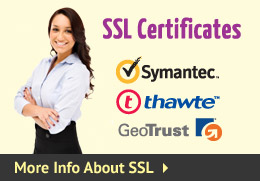
Thawte Wildcard SSL
 Thawte Wildcard SSL Web Server Certificates offer full organization authentication with the capability to secure multiple subdomains on the same server that share the same base domain name. When users click the Thawte Trusted Site Seal or view certificate details, your organization name appears and shows that Thawte, a trusted certificate authority, has verified the site’s identity. SSL Web Server Certificates include full organization authentication, the Thawte Trusted Site Seal, free reissues, and a 30-day money back guarantee.
Thawte Wildcard SSL Web Server Certificates offer full organization authentication with the capability to secure multiple subdomains on the same server that share the same base domain name. When users click the Thawte Trusted Site Seal or view certificate details, your organization name appears and shows that Thawte, a trusted certificate authority, has verified the site’s identity. SSL Web Server Certificates include full organization authentication, the Thawte Trusted Site Seal, free reissues, and a 30-day money back guarantee.
We offer monthly, yearly and multi-year pricing to meet your needs!
Secure multiple subdomains with a single SSL Certificate, reducing management time and cost.
Compare to other Thawte Products.
| Authentication | Organization authentication [ Compare ] |
| Encryption | Minimum 40-bit up to 256-bit encryption |
| Site seal | Thawte Trusted Site Seal; multi-lingual |
| Multi-year options | 1 – 4 years |
| Extended Warranty | n/a |
| Root | Thawte root CA |
| Reissues | Free |
| Support | Web-based knowledgebase, Online Chat, E-mail, Phone |
News Flash: Discontinuing the Use of 1024-Bit Key Length for SSL Certificates and Code Signing Products View more/hide this
Starting January 1st, 2014, the Certificate Authority industry is discontinuing the use of 1024-bit key length on SSL certificates and Code Signing products. This is in compliance with NIST Special Publication 800-131A. Beginning in January 2012, 2048-bit keys were enforced on all new multi-year SSL certificates and Code Signing products.
To maintain compliance, Symantec has started to disallow 1024-bit key length CSRs for the Thawte and Symantec brands starting on September 19, 2012. GeoTrust and RapidSSL will stop support of 1024-bit key length CSRs as of November 11, 2012.
Most SSL Certificates are compatible with the following browsers:
- Firefox 1 +
- Chrome
- IE 5.01 +
- Safari
- Opera 7 +
- Mozilla 1 +
- AOL 5 +
- Netscape 4.7 +

Any server that supports SSL v2 or v3 technology can use our SSL Certificates:
- Web Servers
- Mail Servers
- Hosting Control Panel
- POP, IMAP, SMTP Servers
- File Transfer Servers
- Proxy Servers
These include popular names such as Apache, IIS, Plesk, Exchange, ISA2004/2006, Lotus Dominos, Tomcat, Helm, DotNetPanel, and many more!
What is SSL?
Secure Sockets Layer (SSL) is a protocol for enabling data encryption on the Internet and for helping web site users confirm the owner of the web site. SSL is most commonly used to protect communications between web browsers and servers. However, it is increasingly used for server to server communications and for web-based applications.
What is most effective SSL certificate to combat phishing?
EV SSL products. Extended Validation (EV) authentication is the highest level of authentication available with an SSL Certificate. Any Web site with an established brand reputation should consider the benefits of an SSL Certificate with EV authentication.
What are the requirements for getting an EV certificate?
A signed acknowledgement of agreement from the corporate contact listed on any order for an EV SSL Certificate. A company registration document may also be required if the we are unable to confirm the organization's details through a government database. A legal opinion letter may also be requested to confirm the following details about the organization applying for the Extended Validation SSL Certificate:
- Physical address of place of operation
- Telephone number
- Confirmation of exclusive right to use the domain
- Additional confirmation of the organization's existence (if less than 3 years old), and
- Verification of the corporate contact's employment.
What is organization authentication?
Organization authentication, also known as business identity authentication, is a high assurance level of authentication. SSL Certificates with this level of authentication require verification of an organization’s existence through a government issued business credential. Usually VeriSign, Thawte or GeoTrust will get this independent verification by searching one of many government or private databases to which they have access.
What is domain control validation?
The certificate provider will confirm domain control by sending an email to the administrator listed with the registrar for the domain. If the authorized administrator does not reply, a second email will be sent to an email address at the domain such as info@ or support@. (You may select a secondary email address during the enrollment process.) In addition to validation by email, you will be asked to provide a telephone number where you can be reached immediately after submitting your enrollment. If everything checks out, the SSL certificate is issued.
What is encryption and why are there different levels?
Encryption is a mathematical process of coding and decoding information. The number of bits (40-bit, 56-bit, 128-bit, 256-bit) tells you the size of the key. Like a longer password, a larger key has more possible combinations. When an encrypted session is established, the encryption level is determined by the capability of the web browser, SSL certificate, web server, and client computer operating system.
How do web site visitors know if a web site is using SSL?
When a browser connects to a secure site it retrieves the site's SSL certificate and checks that it has not expired, that it has been issued by a Certificate Authority the browser trusts and that it is being used by the web site for which it has been issued. If it fails on any one of these checks the browser will display a warning to the end user. If it succeeds, several security indicators are built into modern browsers to indicate that SSL is enabled.
- The beginning of the URL or web address changes from http:// to https://
- A padlock on the browser window changes from open to closed
- The address bar will turn green and display the name of the web site owner when connecting to a web site protected by an Extended Validation SSL certificate.
In addition, a trust mark may be added to web pages on a secure site
What does browser recognition mean?
When a browser or operating system encounters an SSL certificate, it checks to make sure that the certificate is valid and trusted. An SSL certificate is trusted if it is signed by a trusted or pre-installed root certificate. If a browser that does not contain the root CA certificate used to issue the SSL certificate, a security warning will alert them.
What is a certificate signing request or CSR?
A CSR is a public key that you generate on your server according to your server software instructions. (If you do not have access to your server, your web host or Internet service provider will generate it for you.) The CSR is required during the SSL certificate enrollment process because it validates the specific information about your web server and your organization.
What is a public/private key pair?
SSL uses unique cryptographic key pairs: each key pair consists of a secret private key and a related public key. Information encrypted with a public key can only be decrypted with the corresponding private key, and vice-versa.











